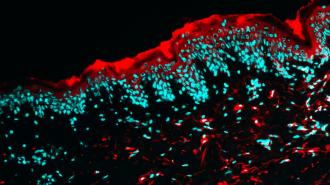Six biotech companies just merged into one, creating a healthcare supergroup committed to helping people overcome skin disorders.
The challenge: Skin disorders are common — at any point in time, one in three Americans is dealing with at least one disorder affecting the body’s biggest organ. Many of these disorders are caused by an overactive immune system or one that attacks a person’s own healthy cells. Eczema, alopecia, and vitiligo all fall into this category.
While remission is possible, most of these disorders cannot be cured, and although some do have treatments, they all have shortcomings — meds to suppress the immune system, for example, also increase a person’s risk of infection.
At any point in time, one in three Americans is dealing with at least one skin disorder.
What’s new? Healthcare-focused investment firm Medicxi has now merged six biotech companies developing treatments for skin disorders into a single company — Alys Pharmaceuticals — and invested $100 million into it.
“We believe that bringing together several asset-centric companies with a phenomenal team will power up Alys to transform innovation in immuno-dermatology,” said Francesco De Rubertis, chairman of Alys and a partner at Medicxi.
Sister subsidiaries: The six companies under the Alys umbrella — Aldena Therapeutics, Graegis Pharmaceuticals, Granular Therapeutics, Klirna Biotech, Nira Biosciences, and Vimela Therapeutics — have a total of 14 active R&D programs.
Alys’ goal is to have clinical trial results for seven to 10 of these treatments within the next three years.
Most are focused on treating skin disorders linked to the immune system. Aldena Therapeutics, for example, has been developing treatments that use molecules called “small interfering RNA” (siRNA) to silence genes that cause excess skin inflammation. Unlike CRISPR or gene therapies, these drugs don’t alter any underlying DNA — they simply “mute” genes that are causing problems.
A handful of the programs target other types of skin problems — Graegis Pharmaceuticals is developing treatments for skin issues caused by radiation therapy for cancer, for example.
Looking ahead: Alys’ goal is to have clinical trial results for seven to 10 of these treatments within the next three years.
“It is uniquely exciting to oversee such a rich and diverse pipeline, bringing forward modalities that will break new ground in dermatology,” said John Harris, Alys’ chief innovation officer.
We’d love to hear from you! If you have a comment about this article or if you have a tip for a future Freethink story, please email us at tips@freethink.com.
